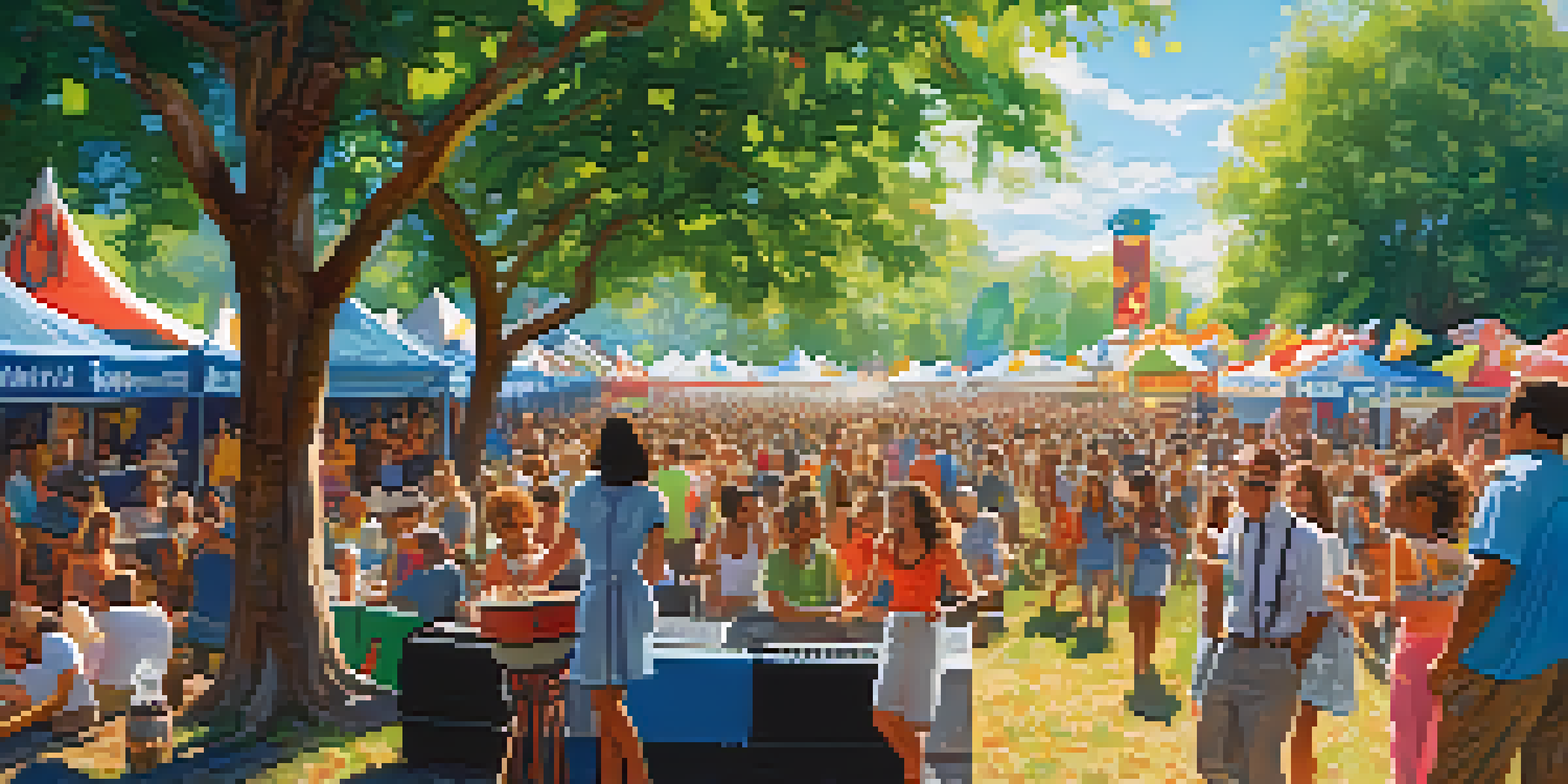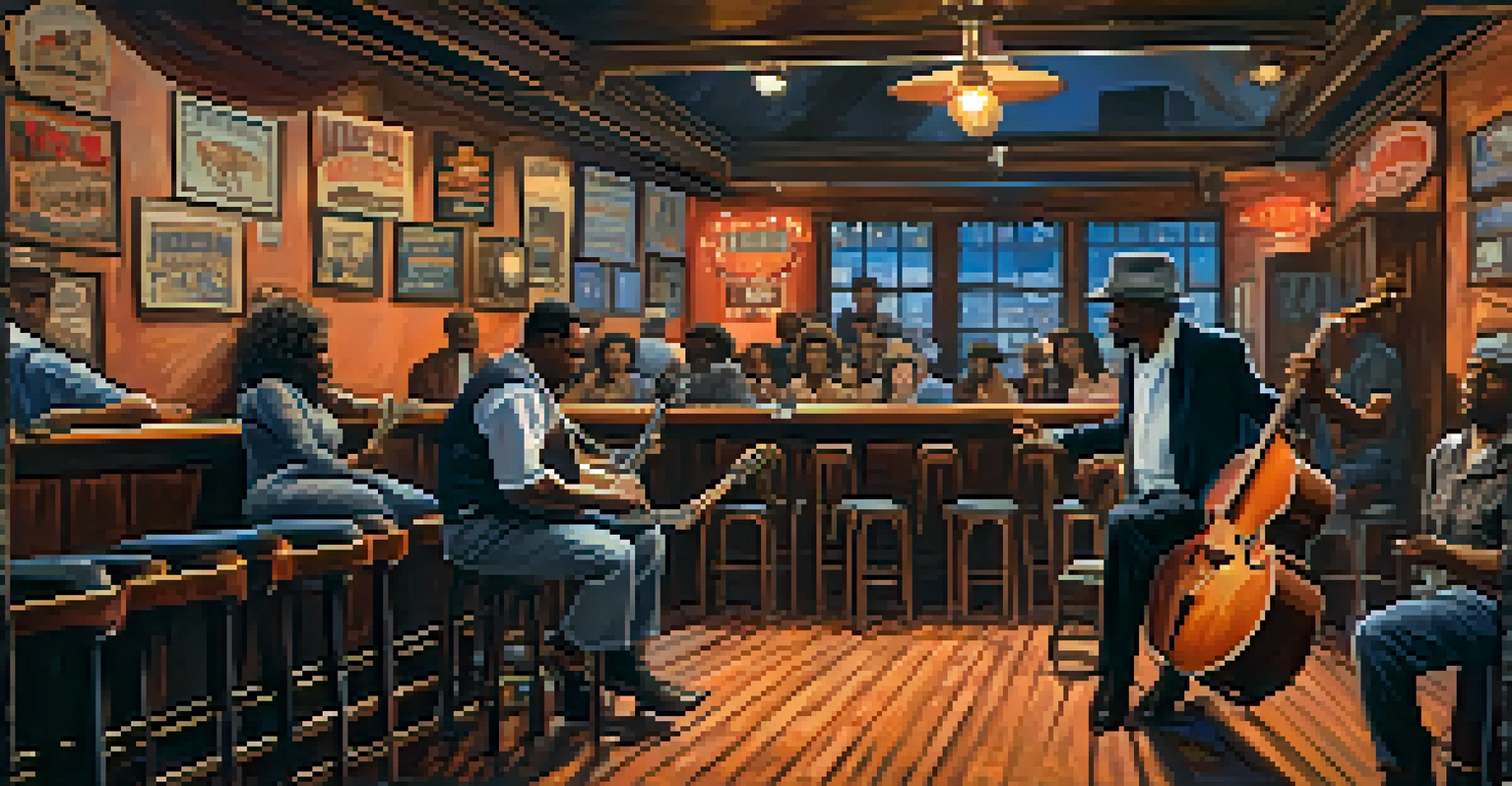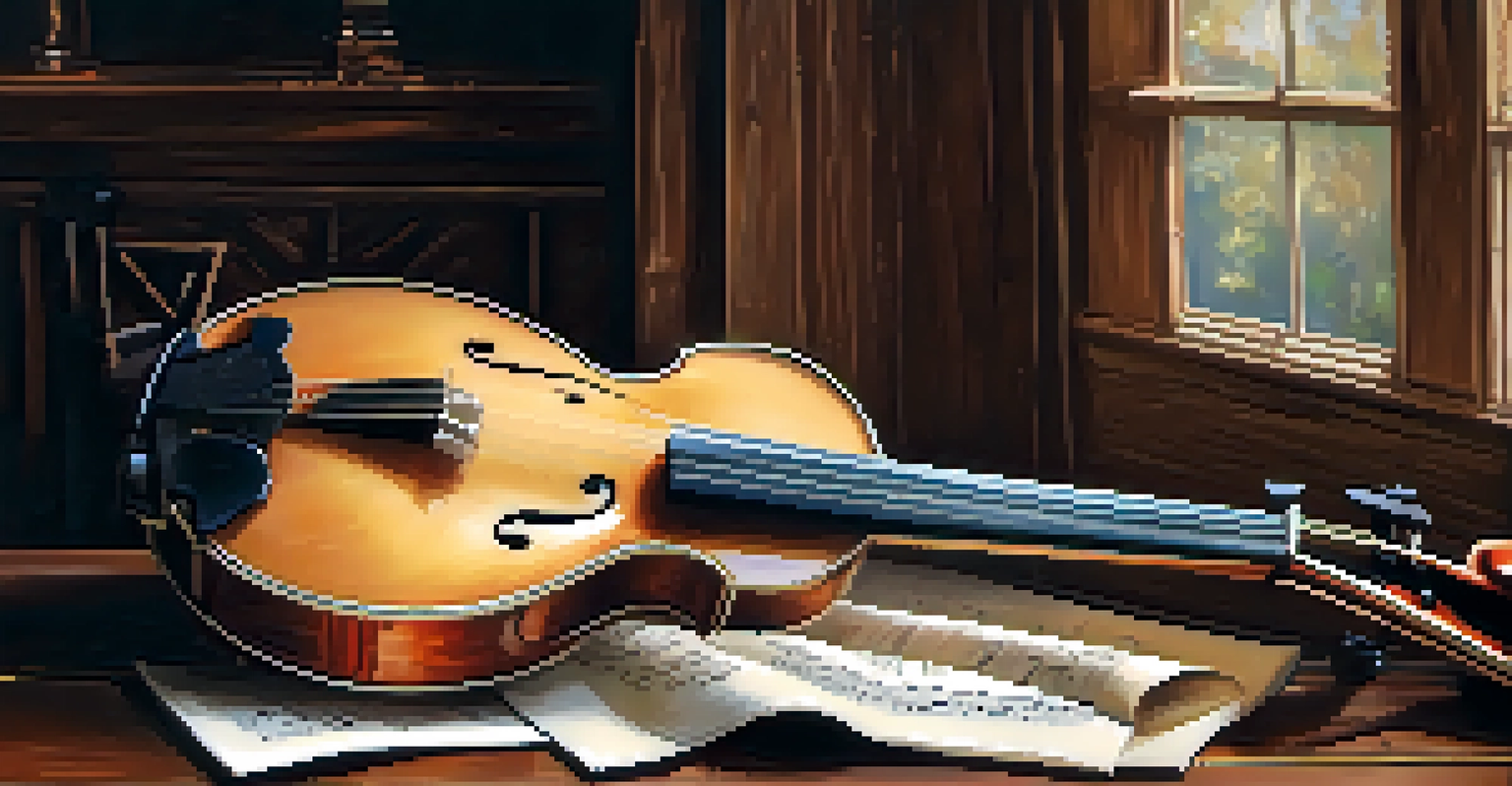The Influence of Southern Music on Cultural Heritage

Understanding Southern Music and Its Roots
Southern music encompasses a rich tapestry of genres, including blues, country, and jazz. These styles not only entertain but also tell stories of history, struggle, and resilience. The roots of this music can be traced back to African, Native American, and European influences, creating a unique blend that reflects the diverse population of the South.
Music is the shorthand of emotion.
The blues, for instance, emerged from the African American experience in the Deep South, expressing emotions of hardship and hope. Similarly, country music, with its storytelling tradition, often draws from rural life and the challenges faced by those living in the Southern states. This deep connection to the land and its people is what makes Southern music so universally relatable.
As we explore this vibrant genre, it becomes clear that Southern music is not just a soundtrack but a cultural chronicle that captures the essence of the region's heritage. It serves as a bridge between generations, preserving the stories and struggles of those who came before us.
The Role of Southern Music in Community Identity
Music in the South often plays a pivotal role in shaping local identities and fostering community bonds. Festivals, gatherings, and events centered around Southern music bring people together, reinforcing a shared sense of belonging. These communal experiences create a tapestry of memories that strengthen ties among residents.

For example, events like the New Orleans Jazz & Heritage Festival celebrate not just the music but the culture and history of the region. Such festivals highlight the influence of Southern music on local traditions, cuisine, and art, showcasing how interconnected these elements are. Through these gatherings, communities can celebrate their heritage while also inviting others to partake in their rich cultural legacy.
Southern Music's Cultural Roots
Southern music reflects a blend of African, Native American, and European influences, telling stories of history, struggle, and resilience.
Music acts as a unifying force, reminding us of our shared experiences and the values we hold dear. It fosters a sense of pride, encouraging communities to honor their past while looking toward the future.
Southern Music's Influence on National Trends
The impact of Southern music extends far beyond its regional roots; it has significantly influenced national music trends. From rock 'n' roll to hip-hop, many genres owe a debt to the sounds and styles originating in the South. Artists like Elvis Presley and Ray Charles brought Southern music to the forefront, shaping the soundscape of America.
Without music, life would be a mistake.
As these genres evolved, they absorbed influences from other musical traditions, creating a dynamic interplay that enriched the American music scene. For instance, the rhythm and blues genre have roots in Southern blues, yet it has transformed into a staple of modern pop and soul music. This cross-pollination illustrates how Southern music continually adapts while remaining true to its origins.
The ripple effect of Southern music can be felt globally, as artists worldwide draw inspiration from its distinctive styles. This influence underscores the power of Southern music as a cultural ambassador, sharing stories and traditions that resonate with audiences everywhere.
Preserving Southern Music Through Education
As Southern music continues to evolve, education plays a crucial role in preserving its legacy. Schools and community programs often incorporate music education that focuses on Southern genres, ensuring that young generations understand their cultural significance. By teaching the history and techniques of Southern music, educators ignite a passion for these art forms among students.
Moreover, workshops and masterclasses led by seasoned musicians provide hands-on experience, allowing students to connect with their cultural heritage on a deeper level. These interactive opportunities often inspire creativity and foster a sense of responsibility to carry forward the traditions of Southern music.
Community Identity Through Music
Festivals and gatherings centered around Southern music foster community bonds and a shared sense of identity among residents.
Educational initiatives not only promote appreciation but also encourage innovation within these genres. As students learn from the past, they are empowered to create new sounds that respect tradition while pushing artistic boundaries.
The Impact of Southern Music on Contemporary Artists
Contemporary artists continue to draw inspiration from the Southern music tradition, infusing their work with its rich influences. Musicians like Kacey Musgraves and Chris Stapleton exemplify how modern interpretations of country and Americana can still reflect Southern roots. This blending of old and new not only keeps the music alive but also introduces it to new audiences.
By incorporating traditional sounds and storytelling techniques, these artists provide a fresh perspective on Southern music. Their work often highlights contemporary issues, making it relevant in today's cultural landscape while paying homage to the past. This dialogue between generations ensures that Southern music remains a vital part of the artistic conversation.
This evolution of Southern music underscores its resilience and adaptability. It proves that while the sounds may change, the underlying themes of love, struggle, and joy continue to resonate across time and space.
Southern Music's Global Reach and Influence
Southern music's influence transcends borders, impacting artists and genres worldwide. From the UK rock scene to Afrobeat rhythms in Africa, the sounds of the South have been embraced and reinterpreted by musicians across the globe. This cross-cultural exchange enriches both the music itself and the communities that engage with it.
For instance, the rise of Americana music in Europe showcases how Southern influences can meld with local traditions to create something entirely new. Similarly, artists in other countries have adopted the storytelling aspects of Southern music, weaving their own narratives into the fabric of the genre. This global dialogue highlights the universal themes found in Southern music, such as love, loss, and resilience.
Global Influence of Southern Sounds
Southern music has transcended borders, impacting artists and genres worldwide while maintaining its unique storytelling traditions.
Ultimately, Southern music acts as a cultural bridge, connecting people from diverse backgrounds. By sharing these sounds and stories, we foster understanding and appreciation for the rich tapestry of human experience.
The Future of Southern Music and Cultural Heritage
As we look to the future, the preservation and evolution of Southern music remain vital to cultural heritage. New platforms and technologies allow emerging artists to share their interpretations of Southern sounds with a broader audience. This accessibility ensures that the music continues to thrive, inviting fresh perspectives while honoring its roots.
Moreover, as societal issues and demographics change, Southern music will likely evolve to reflect these shifts. Artists will continue to address contemporary themes, ensuring that the music remains relevant and resonant. This adaptability speaks to the enduring power of Southern music as a living, breathing cultural force.

The future of Southern music is a promise of ongoing creativity and connection. By nurturing this art form, we not only celebrate our heritage but also pave the way for future generations to find their voices within the rich traditions of Southern music.